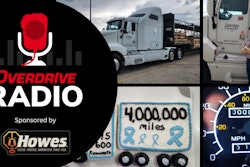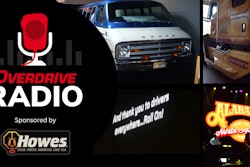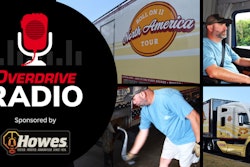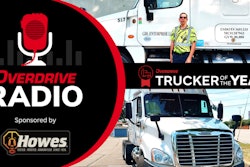This week on the Overdrive Radio podcast, we're diving in headfirst to the history of Wisconsin-headquartered owner-operator Mike Nichols, Overdrive's July Trucker of the Month profiled recently in our Trucker of the Year semi-finalist series by Matt Cole.
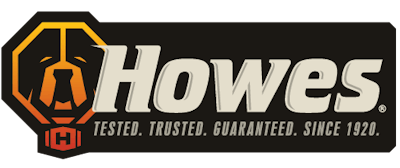 Here's a big thanks to continued support for Overdrive Radio from the fine folks at sponsoring company Howes, longtime provider of fuel treatments like its Howes Diesel Treat anti-gel and Lifeline rescue treatment to get you through the coldest temps, likewise its all-weather Diesel Defender and Howes Multipurpose penetrating oil, among other products.
Here's a big thanks to continued support for Overdrive Radio from the fine folks at sponsoring company Howes, longtime provider of fuel treatments like its Howes Diesel Treat anti-gel and Lifeline rescue treatment to get you through the coldest temps, likewise its all-weather Diesel Defender and Howes Multipurpose penetrating oil, among other products.
Wayne Transports, where he’s specialized in the dry bulk division, is a big part of that.

His was a long road to get to this point, though, and today you can run through the twists and turns of a career that stretches back to his first taste of truck ownership almost four decades ago. The story, in his own words, follows in the podcast:
As mentioned in the podcast:
**Nichols isn't the first owner-operator to benefit from Wisconsin's unique Lemon Law and its application to commercial trucks.
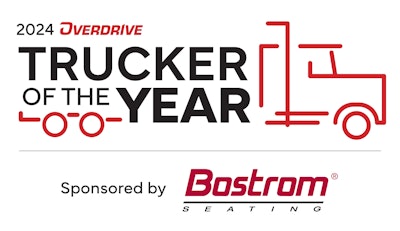 You can enter your own owner-operator business -- or that of another deserving owner -- in Overdrive's Trucker of the Year competition, sponsored by Bostrom Seating, via the initial nomination form at this link.
You can enter your own owner-operator business -- or that of another deserving owner -- in Overdrive's Trucker of the Year competition, sponsored by Bostrom Seating, via the initial nomination form at this link.
[Related: Man's mastery of the freight machine: Trucker of the Month's firm hand in Amazon's system]
Todd Dills: Hey, everybody, it's your friendly Overdrive Radio host Todd Dills coming to you August 5, 2024, with portions of Overdrive news editor Matt Cole's interview with Wisconsin headquartered owner-operator Mike Nichols. Our July Trucker of the Month this year, as Cole wrote about owner operator Nichols -- and I'll post a link to Cole's feature story in the show notes for this edition -- he's hauling leased now to bulk carrier Wayne Transports for most of the last six years running. The owner well knows his strengths and weaknesses and has built his business to hum with that in mind, his prioritization of effective partnerships both on the freight side, with his long term relationship with Wayne, and with a trusted maintenance partner, among others, have his one truck business plenty profitable, even through the difficulties of these last years. Wayne Transports, where he specialized in the dry bulk division, is a big part of that.
Mike Nichols: Same customers often, but I wouldn't call anything dedicated per se. I pretty much just go where I'm needed. I operate mostly in the Midwest, although we get, you know, we get down to the Southeast. I mean, we've got trucks going everywhere. But, I'm just talking about, for me, where I primarily operate is Minnesota, Wisconsin, Iowa, Dakotas, Missouri, Arkansas, Indiana, Illinois. We get out east once in a while, but not too often do I go too far east. I think I've been to New Jersey a couple of times, Pennsylvania a few times. It's great. I love it. I wouldn't want to do anything else right now. I'm spoiled.
Todd Dills: His was a long road to get to this point, though. Today we'll run through the twists and turns of a career that stretches back to his first taste of truck ownership almost four decades ago. After this word from overdrive radio's sponsor hals. We pick up with Nichols looking back on his personal trucking lineage growing up in Illinois. So keep tuned.
Speaker 3: Keep your rig running right year round with Howes Diesel Defender. It provides maximum lubricity to protect your entire system and contains specialized IDX four detergent to clean and prevent deposits. It safely removes harmful water and guarantees a 5% increase in fuel economy or more. Diesel defender is now available at your local O'Reilly auto parts store. You can also grab a bottle at truck stops nationwide or have it delivered when you shop the Howes store on Amazon. Defend your diesel with Howes.
Todd Dills: Find more information about Howes fuel treatments and more at HOWES, howesproducts.com. Here's owner, operator and Overdrive July trucker of the month Mike Nichols, taking us back to the 1970s and early eighties.
Mike Nichols: My stepfather was a trucker. And, Also he was in the, Air force reserve. So he kind of did both things. A lot of times he would be on active duty reserve status. But they would convert him to active duty. But when he wasn't doing that, he was, He was a trucker. So I used to go with him, As a. As a young child as well. 1314 in that area. Twelve. And he unfortunately passed away. He was killed in a plane crash in 1982. A military plane crash. KC 135. So in his void, my friend growing up and his father were into trucks. his father drove and my friend wound up driving. And he actually taught me pretty much how to drive between his dad and he. And then I worked on a hog farm the last two years of high school. And so, we had a lot of tractors and I got interested in that. And, we had a couple of, Straight trucks. Not me as a family. I just worked on a farm. I grew up in a rural area. But we did not farm. And that kind of put the bug in me. And then I also went to community college for, Diesel mechanic. Ag mechanic school. for about three semesters, enough to get a certificate. And I was thinking about going that way in life. And when I got into it, three semesters. I said, well, the biggest thing I've learned is that I probably ought not be a mechanic. So, I kind, of abandoned that idea. But I couldn't get away from. I just. I love trucks and pretty much anything with engines. And so, I went and, Took my money that had been saved up by my mom for me to go to college. And I used that, to make a down payment on a 1980 cabover Kenworth. Single, bunk, 160 inch wheelbase. Rode like it had square tires. Had a three, Hundred and 50 big cam in it. And I just tickled pink, you know, to drive that nine speed direct transmission. But so, yeah, I drove that, you know, at the. I bought it at the young age of 18. And I was planning on just driving at intra state in Illinois. And pretty much that's what I did. I bought a dump trailer. And, My. My friend's dad actually signed the lease. There's different times back then. So you could, Kind Of get away with more than you probably can today. But, yeah. And so I did that. And then, every once in a while I would come up into Wisconsin and get a load of mulch for, a tree nursery in Rockford, Illinois, who was actually who I bought the trailer from, did that for, I guess about a year, year and a half. I met my. My, well, she became my wife, Lesa, October of 85. And I think we bought that first Kenworth in January of 86. so, yeah, pretty. Pretty. Pretty young tender age. and then ultimately, I wound up with the same friend that I bought the truck from. I, wound up trading the Kenilworth in on a Peterbilt 84. Peterbilt 359. Then he drove that truck, and I drove his truck, which was a peterbilt, an 84 362 cab over and a neat truck during this time.
Todd Dills: Then tragedy struck the young Nichols and his wife, Lesa.
Mike Nichols: Unfortunately, Lesa perished in a car accident in may of, 87. So only two months and two days after we married. and so that was, I was in the accident with her. A guy t-boned us. He ran a stop sign. and, after that, while I was recuperating, I wound up selling the 84 359.
And then I was off for probably a good six months, maybe seven months. I had a bunch of broken ribs and a fractured humerus and some other miscellaneous injuries. I went and kind of signed on with a friend not driving my own truck, but driving his straight truck. And we did a lot of feed, farm deliveries. And so I helped him out with that. And then ultimately got a job for a small meatpacking plant in DeKalb, Illinois, hauling their fresh meat every day to the airport, to O'Hare in their truck. It was a Volvo white, I think. Yeah. And did that, And then actually, that actually kind of transcended into, they wanted me to haul livestock for them. And so I kind of went to the school of hard knocks on that because I never hauled a pig in a pickup, you know. So they sent me out to Sioux City, Iowa, to pick up a brand new Wilson trailer. And then, right from there, I had to go to ankeny and load up a bunch of horses. So this was a, This is back when they had a couple of slaughtering plants here in the United States. they would slaughter, I guess they were horses that were pretty much ready for the glue factory kind of thing. But, people. People eat horse meat, like when over in Europe and stuff. And so it was all for export only. But I wound up doing that. And, of course, I think they closed down, but I actually worked there and then got hired on with Ryder resources. so this would have been. I would be like 22 at this point. And I worked there for about two, two and a half years. And then I went back to the horse meat place.
You know, I was always. I just. I never felt comfortable about. About being part of that supply chain. you know, there's a lot of people that would take issue with that, and I think I'm probably in, some respects one of them. But, you know, at the time, I didn't have a lot of options. I couldn't be too choosy. So, you know, and now they, I pretty much. I think they've actually outlawed, that or it's. It's. There's something to it wherever I. They're no longer around anymore. I think there's still maybe a plan up in Canada or something. But yeah, I worked. It was kind of like a pedal route, delivering to stores. I had stores in Wisconsin. I did a route in Michigan. And then, my biggest route was Iowa. I had 26 or 27 stores in Iowa that I would do every Thursday and Friday. And then we were domiciled out of Dixon, Illinois. So, then went to work for Food Liner, pulling a tank. And that's kind of how I got into the tanker.
Todd Dills: Stick a pin in that, for sure.
Year 1992 then rolls into 1993. And Nichols comes to a short-lived conclusion about the course of his life.
Mike Nichols: I decided maybe I didn't want to be trucking anymore, so sold my house and moved out to Colorado. And, I went to a flight school and got a pilot's license, just a private. But, I was going to work my way up and get an instrument and a commercial and, you know, talking to the instructors and stuff. They're just like, you know, I met the instructor was like, I'm actually thinking about quitting this and being a trucker because the money's not real good. So, you know, those guys were, you know, I don't know what they were making at the time, but it wasn't very much. You know, we're talking seven, $8 an hour, you know, and I was like, you know, but the only reason they're doing that is to accrue time, you know. Right. Because back in those days, it was very difficult to, you know, you had to be pretty well healed to buy enough flight hours where somebody would take you seriously, you know, even if you had all the ratings, you know, so I just, you know, I'm glad I did it. I learned a lot, a lot of things I learned in flight school as far as, you know, prioritization and what they call cockpit resource management. a lot of those same fundamentals really apply to trucks, too. I mean, even though you're not flying, but just how you prioritize things, how you keep your eyes moving. you know, the saying in aviation is aviate, navigate, communicate in that order. Just substitute aviate for operate. yeah, I think that's kind of the same thing with, trucking.
Todd Dills: The short lived break from trucking turned into a bit longer break from the road, as Nichols described.
Mike Nichols: I wound up moving back to Illinois, and I worked, in a sales dispatch capacity for a small, LTl carrier in northern Illinois, and did that for a while, and then wound up moving up to Wisconsin. Moved up to Wisconsin and worked, in a traffic management position for a small truck equipment manufacturer and also did some deliveries and some sales inside, outside sales for them. And then decided I wanted to go back into owning a truck again. So in 98, I bought a 379. It was a brand new 98 379, and a 90, eight or nine utility reefer 48 spread, 102 didn't. I was thinking of getting my own authority back then. But, to start off with, I had a neighbor that had a few trucks and had his own authority, so he would just let me use his authority for a small, modest fee a month. And, I would pretty much just work through brokers. And, I did that for probably a good three or four years. Ultimately, I wound up having problems with the truck. So that Peterbilt, that 379, was the Lesa Marie one, if you will, or just the Lesa Marie.
And it was a gorgeous truck. had a 3406 e model cat rated at 518 speed. But I had problems with it. Ultimately, it had a vibration. They just could never figure out where it was coming from. You know, the guys from Meridor came down and checked it out, and I drove it up to Fabco Caterpillar, and they couldn't figure it out, but there was a vibration in it nevertheless. And so that wound up being a buyback, a manufacturer's buyback, on a lemon law. Wisconsin's got a pretty hefty lemon law. so if you have what they call four warranty nonconformities that start in the first year of ownership and or 30 days out of service, you're eligible for that.
Todd Dills: Wisconsin's lemon law has been something of a national unicorn. With respect to commercial trucks, though, it's been a decade since Overdrive surveyed the scene around such laws at the state level. I'll post a link to that past coverage, though, of such laws in the show notes and in the post that houses this podcast when it goes live August 5 at overdriveonline.com. overdrive radio. And this case sounds like Nichols was fortuitous. He bought the truck and lived at the time.
Mike Nichols: And we fought. You know, they didn't want to give me, you know, they didn't want to do anything for me, to be honest. And ultimately, you know, we came to a, consent decree, if you will, and they bought the truck back and compensated me for all my finance interest and all the payments. And then they pay the attorney's fees. And after that, I kind of just got out of owning a truck. I did some other public advocacy work. I actually did some work for the attorney because he was a, he specialized in heavy truck lemon law. And he had said, you know, I could probably use somebody like you to help out now and then, somebody who knows about trucks and also has a reasonable understanding of the law. So, I did that on the side and worked as a, ah, couple of different odd jobs that were not in trucking. And then came back into trucking around 2004 and started hauling gasoline in and around the Milwaukee area, Madison, southern Wisconsin, and did that for a few years. This was about 2008 or so. I got out of the truck and I went to work in the office again, doing dispatch and operations for another tank, bulk liquid, food grade tank outfit, out of southern Wisconsin here. And did that for quite a while.
And then I started hauling for a, ah, company out of Minnesota, hauling dry ice. Continental carbonic was a company, owned by Matheson, Trigas, and hauled for them out of Blue Earth, Minnesota, for, I think pretty much going on about two years. Came back down, was hauling gasoline again around the Milwaukee, area. And the girl had five trucks that I was working for and she wanted, well, she encouraged me to maybe look at buying a truck. And we were going to do kind of a hybrid sort of lease.
She didn't have any owner operators, she just had company trucks. So that was the, impetus for purchasing the Lesa Marie two that I purchased in Marshall, Minnesota. And this would be 2018 or so. So that's a 2013 Freightliner Coronado one, three, two glider. Okay. twelve, seven, let's see, 13 speed. I think it had 300 and 373 rear ends, on, ah, low profile 24 fives. And, I loved that truck. I mean, I had a few bugs in it. I bought it. It had 600,000 on it. actually found a copy of the old registration in the truck and got ahold of the previous owner and discovered that it just had major work that I don't even know that the dealer knew about. And, actually wound up called the Detroit dealer up, the Detroit dealer up in Saginaw, Michigan, and managed to get a copy of the work order, the repair order on that. And sure enough, they had went through the whole thing at, you know, like 60, 70,000 miles before I bought it. So very sound, mechanically, but, you know, still a 600,000 miles truck. It had had a few problems. I, had the power divider go out of it, like a month or two after I bought it and, a couple other small things.
But by and large, it was a great truck. I drove it 220,000 miles. It didn't work out, with leasing that on with her. She, ultimately, quit the business. But one thing that she imparted to me is that I should, instead of working for her, I should actually go to Wayne. So I went to call up Wayne Transports. Initially, I was going to haul, tried to haul gasoline for them. We've got a terminal here in Wisconsin, and they didn't have any extra tanks at the time, but the guy that I spoke with said, hey, if you're interested, the dry bulk division might be willing to talk to you. So I gave them a call, Dan Anderson, the, dry bulk manager. And we talked for quite a while, and I told them about my background, brought the truck up, this would be November of 2018. Signed it on, and I haven't looked back. I've been with Wayne ever since. I was going to keep that truck until, you know, I just about had it paid for, and I was going to keep it probably until, like, 2023 or four was my plan.
But they changed the glider rules in 2020. So that was the impetus or incentive to order a new truck. And I was going to trade the Lesa Marie two in, but they didn't want to give me anything for it. So I wound up selling her outright, to a guy from the Chicago area who, was pulling a Conestoga with her. And I saw him a few times afterwards. He left all the paint. He left the Lesa Marie on it. He goes, oh, I could never change that. He goes, that'd be like changing the name on a boat. It's bad luck. So, yeah, he left, all the markings and everything on it, and I haven't talked to him in the last few years, so I'm not sure if he's still working at it.
You know, that was, 20, you know, 2020. We're kind of getting into the pandemic. Rates were really good, you know, even just working the load boards and stuff. So I know he was killing it for a while. I don't know. I'd say I don't know how he's doing now. But, yeah, I would have been happy with the, with Lesa Marie, too, for, you know, going forward for a while, it was fantastic truck, but I thought, if I'm ever going to, you know, I'm going to buy a new one, I better do it now. And so I purchased this one.
I ordered it, same place I purchased Lesa Marie two Harrison truck centers out of Marshall, Minnesota. But the glider builder for Harrison's in Waterloo. And they changed their names, actually, during the time that I was waiting for the truck to come in, Harrison sold out to truck center companies. So I was, probably a good, you know, I drove the Lesa Marie two until, like, the end of November of 2020. And then, it was probably February of 2021 before I actually took delivery of Lesa Marie two. But I signed the papers by the end of the year, you know, so it was all legal. But, they did a bunch of work, a bunch of, you know, I mean, they're glider shops, so they're a builder, so they put her all together. And, just, I mean, yeoman's work across the board. The way that turned out, I mean, I almost. I was amazed, you know, because I kind of just told them, like, what I wanted conceptually, you know, as far as exhaust and things like that. Yeah. Can't say enough, enough great things about them. They were, they were awesome to work with. Yeah. So I've been running it now. She's got, I'm just shy of 300,000 on the Lesa Marie three.
Todd Dills: That's a 2020 Freightliner Coronado.
Mike Nichols: And she's been a good truck. of course, you know, again, it was brand new. This one has a Detroit, but it's a 14 liter series 60. Okay. it's the, DDEC four. So there's, It's kind of an odd or a rare motor, they tell me, because they, Detroit only made those without the EGR for a short amount of time, I mean, just a matter of months, if not, you know, less than a year for sure. So it's kind of rare there. And again, it's a factory remanufactured engine. So, you know, it's not, you know, it's not being done at a shady shop or anything like that. You know, there a lot heard a lot of problems that, you know, people were buying junk engines and came with a factory warranty and all that. So how does the 14 liter compared to the twelve seven in your experience so far with it? Not quite as good a fuel mileage? I can still manage to get mid sixes, sometimes low sixes, sometimes a little more. The twelve seven would be up closer to seven. power wise, it's this one, it's rated at 550. I actually had it dynoed 5000 miles after I bought it. It was put in 578. I did a couple of upgrades, I put a PDI tuner on it. So they say that gives you 10% or so. I would say it's almost seems it's about the same, you know, the way that I normally drive it. The twelve seven, I had a bigger turbo and a full tilt manifold, Borgwarner stage one turbo and a bully dog tuner on that truck. And so probably with those enhancements on that truck, it's, you know, horsepower wise, it's probably really about the same. Yeah. But, the 14 liters just gets a bigger engine. It doesn't have to work as hard. One thing on the Lesa Marie two that I had issues with is I had plenty of power, but it would make heat, you know, you'd start getting warm going up a hill and stuff. So, on this truck, I ordered a custom four states radiator, probably rated for like 1000 horse. So I never have any problems with heat anymore because, you know, you can make all the horsepower you want, but if you can't keep it cool, heat is a killer. Heat is a killer. And I can go down the road now and just watch and she'll run right between 179 and 187. You know, where the thermostat opens and closes and you know, even going up the hill sometimes I'm watching the temperature drop off. You can still get it warm, you know, if you're good and heavy and it's hot out and you're pulling a good grade, I mean, yeah, but nowhere near like the other one. So. Working out real well with that. Also have an apu on the Lesa Marie three, I had an Apu two on the, Lesa Marie two.
And that is, that's trucking 2.0. That's a game changer. Just, not having to idle, you know, always having your batteries charged. Not, having to worry about plugging it in. It'll keep everything warm. You know, sometimes in the winter, I even leave the heat on, you know, so windows are never lifted over. If I'm getting lazy in my old age, I don't know. But, yeah, no, it's, that super, super great investment on that. And that's a thermal king tripad.
Todd Dills: Owner operator Mike Nichols, as he noted, has found a longer term home finally leased to Wayne Transports, working with the dry bulk division. He started with them in November 2018. He said, though…
Mike Nichols: Wish I would have found them 30 years ago. Would have saved me a lot of time. Would have saved me a lot of time and money and grief. I can't say enough good things about Wayne. They're, a wonderful company, family owned. I think it's third generation, probably, what I would call a midsize company. Several hundred trucks, a few terminals, throughout the midwest. I would call them the preeminent Volk carrier in the midwest, if not the entire country. They've treated me like family since the day I leased on, and I've never been with a company with a greater commitment to safety, customer service, and, mutual profitability. you know, they recognize that they're independent contractors as well as their company drivers. if they're successful, the company is successful, the customers are happy, and, you know, safety is a huge thing with me, and it's also a huge priority with Wayne. So I'm glad to be with a company where we share, the same kind of philosophy. I pull food grade dry bolt, food grade pneumatic. For me to try to do that, say, you know, hang out my own shingle and do that would be, really impractical.
So, you know, not only is there the, the acquisition cost of the trailer, which is pretty expensive, but, you know, you're, then you're going to be limited on, you know, you're not going to be able to drop that trailer and grab another one and go load it. You're going to have to wash it every time, and so you have to be with it and so forth. So for me, it's worth giving up the percentage, that they take, you know, because they're doing all the billing. So I'm not worried about that.
They're doing all the permitting. I get use, of their fuel card, which, you know, their fuel discount. so that's usually saving me sometimes up to gallon off the pump price. So that's a huge bonus right there. You know, I have, you know, of course, can have their liability insurance. Then, I get my physical damage through them. And then, we have some other issues, some other benefits, that they have like, you know, disability that I. That I picked up a plan on. And I. There's some health benefits, but I have a different health plan, on my own, so I haven't availed myself of those yet. No. I mean, it's a fantastic company. I can't recommend them enough operationally.
Todd Dills: It's not uncommon to haul out loaded and empty back.
Mike Nichols: And also, you know, it's not uncommon to have to go 5600 miles to get the next load. And, even getting to a wash sometimes can be challenging depending on where you're at. there's just not a lot of them, you know. Right. but, you know, dispatch is great, you know, as far as, you know, looking at a load combination of loads and seeing if it makes sense and then, you know, put me on it. I almost never have to worry about that. But sometimes, sometimes you come back empty. I mean, that's just, that's just. It is what it is.
Matt Cole: How long do you typically stay out at a time?
Mike Nichols: It varies. usually a week. Sometimes I'm home a couple times during the week. Sometimes I'm gone two weeks. But I would say 80% of the time I'm home once a week. If I stay out a little longer, I'll take off a couple more days. So, like, I got home yesterday, I'm off today and tomorrow, and then I'll be leaving Saturday. So it's not, you know, if you don't mind working weekends, you know, and you can work with them as far as you know. And not every. You don't have to work every weekend by any stretch. But, I mean, I'm my own boss, but ultimately the customer's boss, you know. And so that's kind of how I. Kind of how I treat it. I mean, I try to work with them and they work with me and we get, we get the job done.
Todd Dills: Nichols’ sense of teamwork with his leasing partner in Wayne transports extends also to his go to for maintenance. Regular overdrive radio listeners will recall the talk with Alan Kitzhaber. Likewise Wisconsin-headquartered owner operator who earlier this year crossed the 4 million mile threshold in his 1995 Kenworth T600 he's been driving since it was brand new. Mike Nichols’ maintenance go-to happens to be the self same one that Kitzhaber’s long utilized in Chippewa Falls, JR Truck Repair.
Mike Nichols: Where I actually park at is also where I get all my maintenance done at, junior truck repair and fabrication. they're located in, Chippewa Falls, the lake halley, area of Wisconsin, kind of just north of Eau Claire. Fantastic, place to get your service done. It's almost like having your own pit crew. They're very reasonable rates. When I first bought Lesa Marie two, I was living down in the Madison area, so I was getting a lot of work done at the dealer. And it's just like every three, six months, their labor rates going up. They're well over $200 an hour now. You know, it's, it's really hard. As I alluded to earlier in the conversation, Matt, I'm on, I'm not the greatest mechanic. Other people can do that job a lot better than I can. And I know, you know, most people would say, you know, being an owner operator, it's probably a good idea to be, you know, pretty handy mechanically. And I would typically, I would tend to agree with that. but I'm on a strict maintenance schedule. I mean, I want somebody looking at that truck, you know, at least once or twice a month, you know, if nothing else, then, you know, preventive stuff, grease and, you know, inspections, things like that. I change the oil about every 15 to 20,000. That's probably more often than some guys do.
But I just think there's, the benefits of catching something early outweigh the additional cost. Right. Especially if you're working with a really good shop that you trust. And I do. I trust these guys implicitly. They're, they're not just, you know, you go to a lot of dealerships now and you wind up with parts changers. you know, the guy knows how to change a part and if it fixes it, great. And if it doesn't, well, then they change another part. It's hard to find a good diagnostician anymore. And, Adam over at, junior truck repair, the owner is, excellent, as is, his brother and his techs that work for him. So they're all really good. I have a, bypass filter, so that helps. you know, you could probably go a little longer on your oil changes with that. You know, they actually recommend or say that you can go, I don't know, 50,000 miles. I just can't do that. The psychology doesn't work with me, so it gets changed a little more often. But, I still think it's a worthy investment just to, have, some extra filtration on that oil. It's an FS 2500, bypass oil filter, low bypass. I had one on the Leesa Murray, two as well, and it made a big difference in soot. Reoccurring issue with the Detroit's I think, is heavy soot and I've been able to mitigate, that substantially.
Todd Dills: Here's a big congrats to owner operator Mike Nichols, Overdrive's July Trucker of the Month. Stay tuned for more from Nichols in the next edition of Overdrive Radio about how he's weathered the tough conditions for owner operators these last couple of years.
Mike Nichols: I actually made more money in 22 than I did 23, but I think a lot of that is an artifact of the high fuel price.
Todd Dills: Nichols’ advice for new and or aspiring owners, and much more. You can enter a deserving owner-operator in Overdrive’s Trucker of the Year program, sponsored this year by Commercial Vehicle Group and Bostrom Seating. Enter your own business too. If you've weathered the economic cycles effectively yourself, you can do all that via overdriveonline.com/TopTrucker. Nichols and all of our truckers of the month thus far for 2024 are in the running for a Bostrom seat and a custom replica of their tractor as trophy for the eventual Trucker of the Year award. Get yourself in the running again via overdriveonline.com/toptrucker. Find that link too in the show notes. Wherever you find the podcast.

